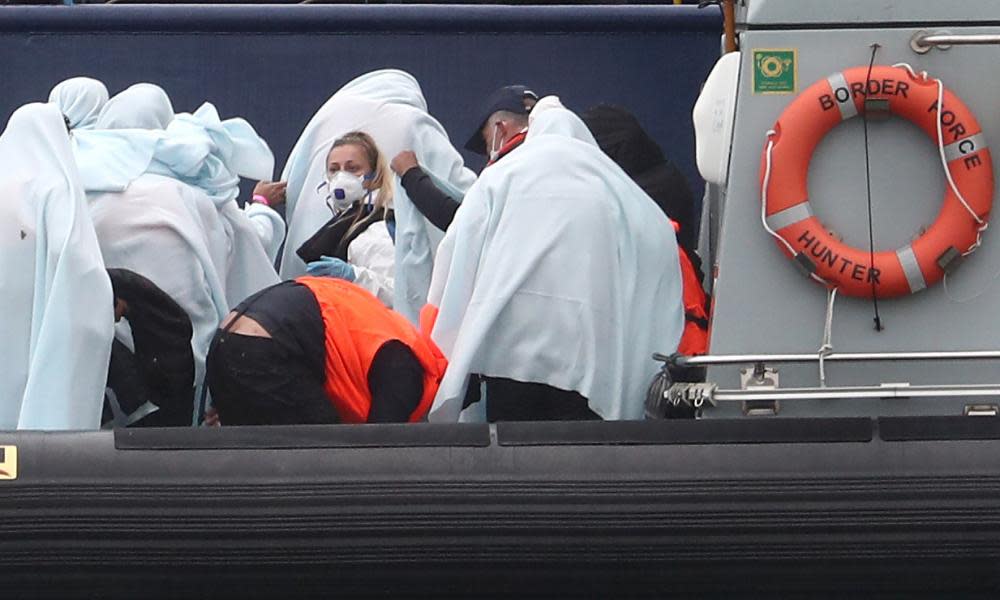Q&A: what’s the real story behind recent UK refugee arrivals?

Q: Media reports suggest that many refugees are making a beeline for the UK. Is this correct?
A: The UK is home to just 1% of the world’s 29.6 million refugees. Asylum seekers make up a very small percentage of overall migrants to the UK with study and work cited as the main reasons why people want to come to the country, according to research from Oxford’s Migration Observatory. Asylum applications in the UK are relatively low – 35,099 in the year ending March 2020, significantly lower than a peak of 84,000 applications in 2002.
Q: Why don’t refugees who have made it to France just stay and claim asylum there? It is a safe country.
A: Some of those travelling to the UK from France have only been in France for a matter of days, and some brought by smugglers from countries such as Iran or Iraq do not even know which European countries they have passed through. The smugglers, not the refugees, determine the final destination. Those who have spent time in France and have a specific plan to get to the UK may have family or community links or speak English. The asylum system in France has a reputation for being harsh. A ruling last month by the European court of human rights condemned France for inhuman living conditions for asylum seekers.
Q: At the end of the Brexit transition period what will happen to current policy under the Dublin Convention, which allows the UK to return people to France or another European country if they spent time there before coming to the UK?
A: At the moment no agreement on this issue has been drawn up between the UK and the EU so unless or until a replacement agreement is put in place the UK will no longer be able to remove people who arrive from northern France at the end of the Brexit transition period.
Related: 'He held a gun to my head': savage stories of Channel people-smuggling
Q: Which countries are hosting the largest numbers of refugees?
A: Turkey, Pakistan, Uganda and Sudan hosted the highest numbers of refugees at the end of 2018, while 85% of refugees live in the country bordering their own. In the last four months of 2019 Spain, France, Germany and Greece received the highest number of asylum applications in Europe, 74% of all the applications in Europe between them. The 1951 Refugee Convention guarantees the right to claim asylum and recognises that many refugees have to use irregular means to escape and seek sanctuary. There is no legal way to travel to the UK to seek asylum.
Q: Are most asylum seekers coming to the UK in small boats from northern France?
A: Last year 35,566 people claimed asylum in the UK. But only an estimated 1,892 arrived in small boats. The top four countries for asylum claims in the year ending March 2020 were Iran, Albania, Iraq and Pakistan. While there are many Iranians and Iraqis in northern France hoping to seek asylum in the UK, those claiming asylum from countries like Pakistan and Albania as well as other conflict zones such as the Democratic Republic of the Congo are less likely to use this route. Not all nationals from countries like Iran and Iraq travel overland from Europe to UK. Some travel by other means such as on planes using false documents.
Q: Do we know exactly how many people are arriving in the UK on small boats?
A: No. Although the Guardian understands that the Home Office has a flag on its internal systems to identify who has arrived in a small boat on the Channel, Home Office sources have confirmed to the Guardian that they do not publish annual or quarterly data on this. The snapshot figures released by the Home Office do not provide the full statistical picture.
Q: Which nationalities are coming to the UK in small boats?
A: It is no coincidence that many of those risking their lives travelling in small boats have fled some of the world’s worst conflict zones or countries with appalling human rights records such as Afghanistan, Eritrea, Iran, Iraq, Sudan and Syria.

 Yahoo News
Yahoo News 
